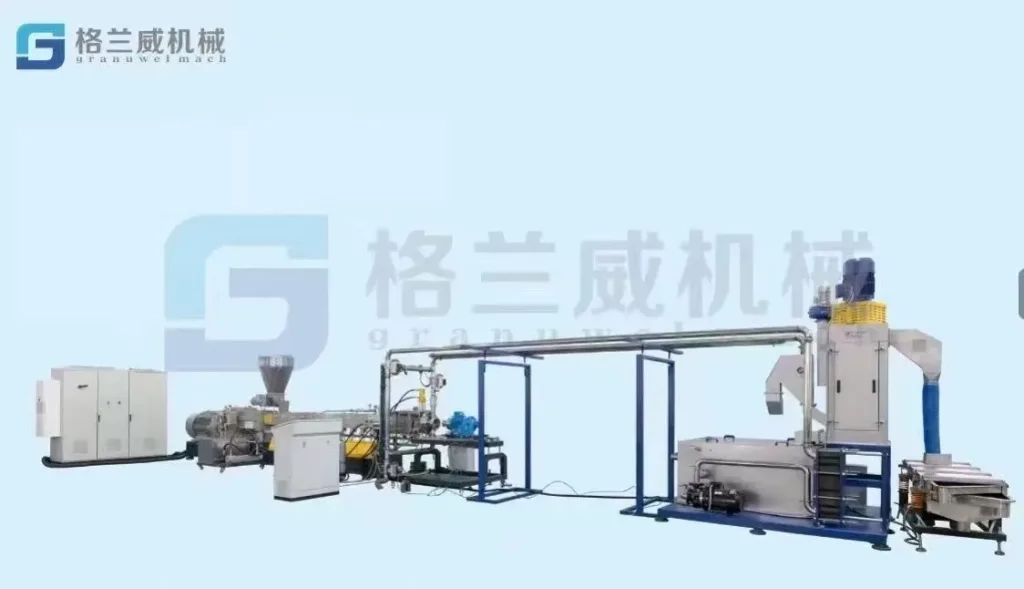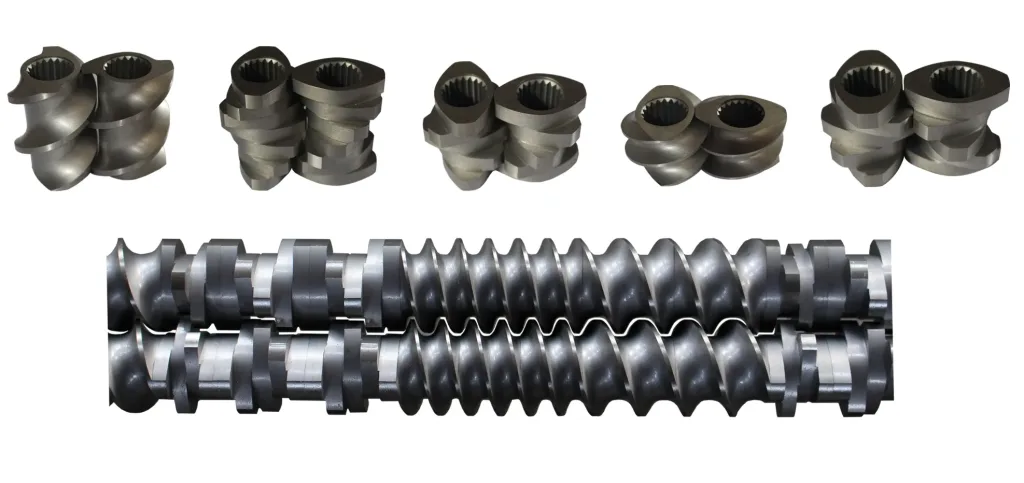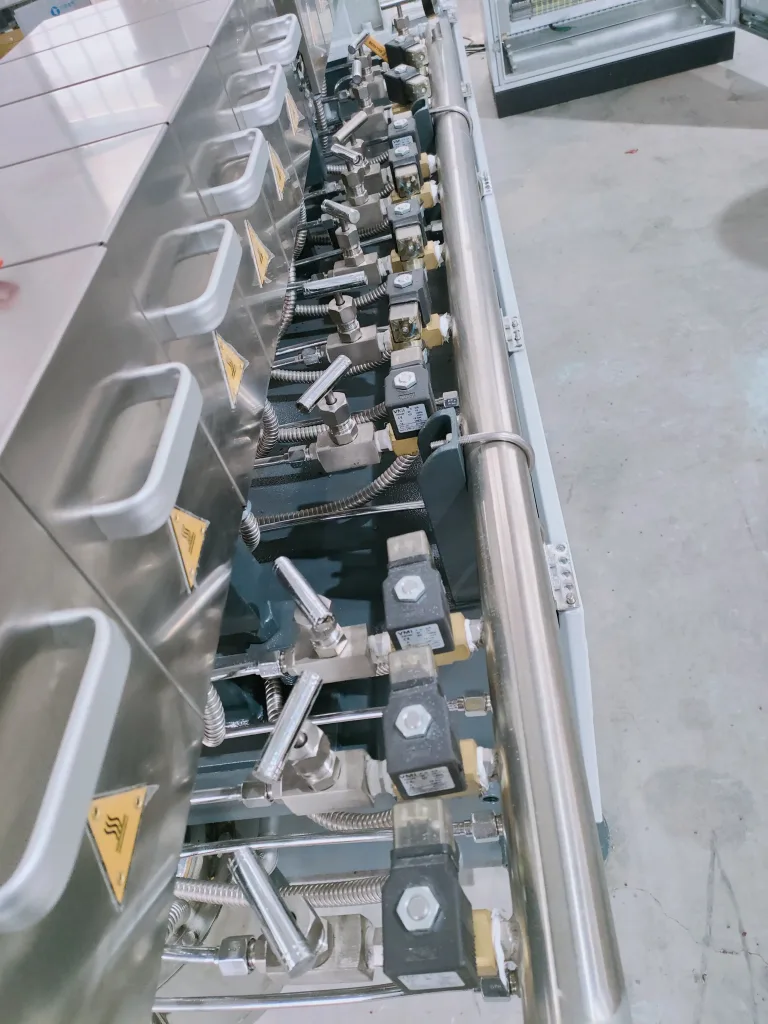플라스틱 제조의 경쟁적 환경에서 트윈 스크류 압출기가 가능한 한 오랫동안 최고의 성능으로 작동하도록 하는 것이 중요합니다. 이렇게 하면 생산성과 제품 품질이 극대화될 뿐만 아니라 가동 중단 및 교체 부품과 관련된 비용도 크게 절감됩니다. 이 기사에서는 트윈 스크류 압출기의 서비스 수명을 연장하기 위한 포괄적인 전략을 자세히 살펴봅니다.

목차
토글정기적인 유지관리: 장수의 초석
정기적인 유지관리는 모든 기계의 수명을 연장하는 데 필수적이며, 이중 스크류 압출기도 예외가 아닙니다. 엄격한 유지관리 일정을 수립하려면 주기적인 검사, 세척 및 부품 교체가 필요합니다. 기어박스의 윤활유는 Granuwel의 사용 설명서에 명시된 오일 교환 시기에 따라 정기적으로 교체하십시오. 실린더 냉각 시스템의 냉각수는 사용 설명서에 따라 정기적으로 교체하고, 실린더 막힘을 방지하는 데 중요한 음이온 냉각수를 사용하십시오. 나사, 배럴, 베어링과 같은 주요 구성품은 마모 여부를 정기적으로 검사해야 합니다. 부식, 균열 또는 상당한 마모와 같은 문제를 조기에 감지하면 더 심각한 손상과 나중에 비용이 많이 드는 수리를 방지할 수 있습니다.
고품질 공급 재고: 불순물, 돌, 금속 및 기타 이물질 공급 감소 - 내부에서 외부로 마모 감소
트윈 스크류의 풀 메싱 특성으로 인해 두 평행 스크류 사이의 간격이 매우 작고 금속 이물질 공급은 확실히 스크류를 죽게 합니다. 따라서 압출 공정에 사용되는 공급 원료의 품질은 장비의 마모에 직접적인 영향을 미칩니다. 금속 부스러기, 모래 또는 기타 연마재와 같은 오염 물질은 스크류와 배럴 표면에 심각한 손상을 일으킬 수 있습니다. 엄격한 품질 관리 조치를 구현하면 깨끗하고 고품질의 재료만 압출 공정에 들어갑니다. 또한 여과 시스템을 사용하여 공급 원료에서 불순물을 제거하면 기계를 더욱 보호할 수 있습니다.
최적의 나사 설계: 성능 맞춤화
생산의 특정 처리 요구 사항에 맞게 나사 설계를 사용자 정의하면 효율성을 높이고 기계의 스트레스를 줄일 수 있습니다. 다양한 재료와 공정에는 피치, 깊이 및 반죽 블록 측면에서 다양한 나사 구성이 필요할 수 있습니다. 나사 설계자 및 제조업체와 긴밀히 협력하여 운영에 최적의 설정을 만들면 압출기가 불필요한 부담을 최소화하는 조건에서 작동할 수 있습니다.

온도 제어: 열적 저하 방지
압출기 내부의 온도 관리가 중요합니다. 과열은 처리되는 폴리머와 기계 구성 요소 자체의 열적 저하로 이어질 수 있습니다. 고급 온도 제어 시스템을 활용하면 배럴을 따라 가열 구역을 정밀하게 조절할 수 있습니다. 일관된 온도 모니터링 및 조정은 이상적인 처리 조건을 유지하는 데 도움이 되므로 압출기 내부의 무결성을 보존합니다.

교육 및 운영: 인적 요소 고려 사항
작업자의 전문성은 트윈 스크류 압출기의 수명에 중요한 역할을 합니다. 적절한 교육 프로그램을 통해 작업자는 올바른 로딩 절차, 온도 설정 및 일반적인 문제 해결을 포함하여 장비를 작동하기 위한 모범 사례를 이해합니다. 잘못된 취급 또는 부적절한 작동은 조기 마모 또는 심지어 치명적인 고장으로 이어질 수 있습니다. 지속적인 교육 및 재교육 과정을 통해 인력은 최고의 성과를 유지하는 데 능숙합니다.
윤활: 마찰 최소화
적절한 윤활은 움직이는 부품 간의 마찰을 줄이는 데 필수적이며, 이는 마모를 최소화합니다. 윤활 시스템을 정기적으로 점검하고 조정하면 모든 움직이는 부품이 적절하게 윤활됩니다. 압출기에서 발견되는 고온 및 고압 응용 분야를 위해 특별히 설계된 고품질 윤활제를 사용하면 작동 수명이 더욱 연장됩니다.
모니터링 및 진단: 사전 유지 관리
고급 모니터링 시스템을 통합하면 온도, 압력, 모터 부하와 같은 다양한 매개변수를 실시간으로 추적할 수 있습니다. 이러한 시스템은 문제가 심각해지기 전에 잠재적인 문제를 예측할 수 있는 귀중한 데이터를 제공합니다. 예측 유지 관리 기술을 활용하면 사소한 문제가 심각한 문제로 확대되기 전에 해결할 수 있으므로 계획되지 않은 가동 중지 시간을 피하고 압출기의 수명을 연장할 수 있습니다.
결론
이러한 종합적인 전략(정기적인 유지관리, 고품질 원료, 최적의 스크류 설계, 온도 제어, 작업자 교육, 적절한 윤활 및 고급 모니터링)을 구현하면 트윈 스크류 압출기의 서비스 수명을 크게 연장할 수 있습니다. 이러한 각 요소는 마모를 줄이고 효율성을 높이며 제품 품질을 유지하는 데 중요한 역할을 합니다. 이러한 분야에 투자하면 장비를 보호할 뿐만 아니라 플라스틱 제조 산업에서 지속적인 수익성과 경쟁력을 보장할 수 있습니다.
자세한 내용은 GRANUWEL EXTRUSION에 문의하시기 바랍니다.
